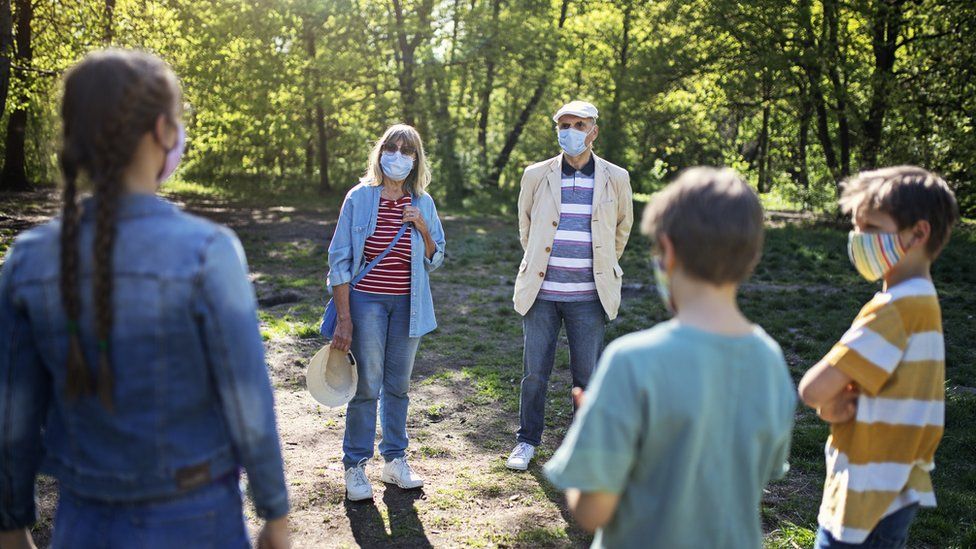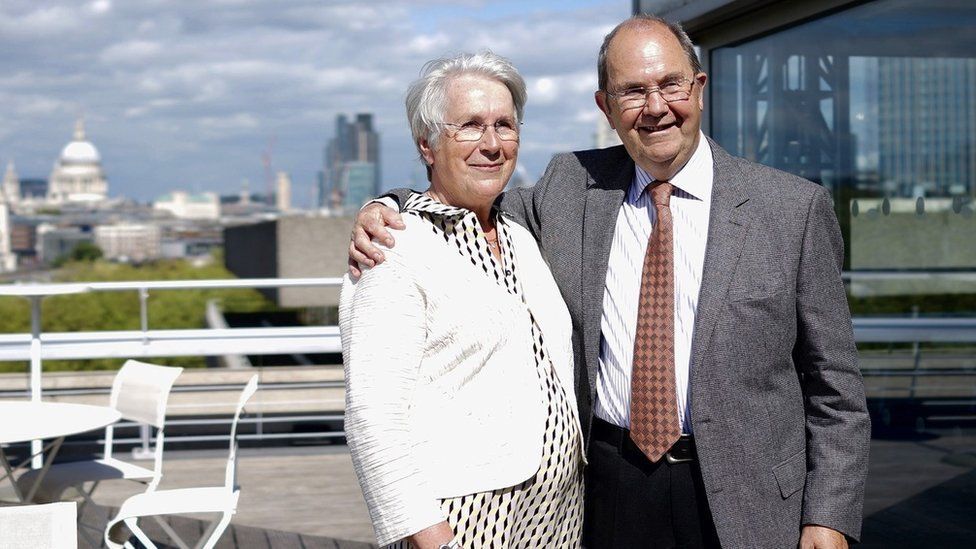UK Covid lockdown easing: A No 10 'priority' is to allow more social contact
 image copyrightGetty Images
image copyrightGetty ImagesReuniting families and allowing people to have more social contact will be an "absolute priority" in easing lockdown after schools reopen, No 10 says.
Options being considered include allowing two households to mix outdoors in the coming weeks.
It comes after confirmation that care home residents in England will each be allowed one regular visitor from 8 March.
The full plan for England's lockdown easing is due to be set out on Monday.
Prime Minister Boris Johnson has previously said that reopening schools will be the first step - but teachers' unions have said it would be "reckless" to bring back all pupils together.
A final meeting is expected to be held on Sunday before the prime minister unveils the full "road map".
Any relaxing of social contact rules will be focused on the outdoors, where transmission is less of a risk. The rules for England's current national lockdown, which began on 4 January, only allow people to meet one person from another household for exercise outdoors.
The devolved nations of the UK have the power to set their own coronavirus restrictions, and have been moving at different speeds to ease lockdown:
- In Scotland, the government hopes to publish a route out of lockdown next week, but First Minister Nicola Sturgeon has urged people not to book Easter holidays
- In Wales, First Minister Mark Drakeford has announced up to four people from two different households can exercise outdoors together from Saturday; he said he hoped the "stay-at-home" requirement could end within three weeks, with some non-essential shops and hairdressers possibly reopening at the same time
- Northern Ireland's health minister has played down the prospect of restrictions being eased in time for Easter - a review of current measures will take place on 18 March
Mr Johnson said during a coronavirus briefing this week that steps taken to ease lockdown should be "cautious but irreversible"..
He hailed the success of the UK's vaccine rollout, but warned the threat from the virus remained "very real" and now was not the time to "relax".
The latest business leader to express concern at lockdown measures continuing is John Vincent, co-founder of fast-food chain Leon, who has said extending lockdowns will "cost lives" as businesses keep losing money that should be going to their employees and the government through taxes.


The political reality is that Boris Johnson had to offer up a date for when he'd explain the path out of lockdown.
There are those on the Tory backbenches who would not have accepted an open-ended timeline.
But the government would argue that naming 22 February wasn't some arbitrary effort to buy time, rather a logical choice - one that's linked to the aim of reopening schools, two weeks later, while allowing both the lockdown and vaccine programme to take effect.
Regardless of considerations in play, the long-awaited road map does now loom on the very near horizon.
Government sources insist that the details are, even now, still being finalised.
But with two days to go a broad plan must now be in place.
The government can try and stress caution or talk about caveats but all the build-up has led to a growing sense of anticipation.
And, for many, that anticipation's linked to a hope that our daily lives may soon be less limited.

In care homes, in addition to the new "one visitor" rule, outdoor visits - as well as those inside pods or behind screens - will be able to continue.
The government said the new measure, which follows advice from the deputy chief medical officers and Public Health England, is the next step towards normal indoor visits resuming.
Health Secretary Matt Hancock said he was pleased people would soon be "carefully and safely reunited with loved ones".
"This is just the first step to getting back to where we want to be," he said. "We need to make sure we keep the infection rate down, to allow greater visiting in a step-by-step way in the future."

'It's too late for my wife'
 image copyrightSelina Geddes
image copyrightSelina GeddesMichael Blakstad says the new visiting rules have come "too late" for his wife Tricia, who has Alzheimer's disease and lives in a care home in Hampshire.
Since moving into the care home last July, Tricia has only been able to see visitors who wear face masks and for a short period of time over a fence, Michael told BBC Radio 4's Today programme.
He believes the restricted visits, combined with periods of isolation, with no contact other than her carers, has led to her Alzheimer's deteriorating much faster than it should have done.
As a result, Tricia has gone past "the point of no return" so the new visiting provisions will not make a meaningful difference for her, Michael says.
"It's far too late for Tricia now. Two or three months ago, Matt Hancock promised [on the Today programme] that every care home would have this testing by Christmas.
"It didn't, the home Tricia's in never adopted it, and I think it's too late."

Liz Kendall, shadow minister for health and social care, said families had been calling for the resumption of care home visits - made safe with access to personal protective equipment and testing - for seven months.
"Over this period, ministers have repeatedly failed to grasp how important families are for the physical and mental health of care home residents, and the appalling impact preventing visits has caused," she said.
In Scotland, care home residents will be allowed up to two designated visitors once a week, under Scottish government guidelines due to be published on Wednesday.
Chief nurse for adult social care Prof Deborah Study said while she knew people wanted to hug and kiss their loved ones, lives could be put at risk so people had to continue to follow the rules.
James Tugendhat, chief executive of HC-One, Britain's largest care home provider, said the move was "welcome news" for families and colleagues.
He told BBC Radio 4's Today programme: "Visiting is obviously a fundamental and necessary part of care home life and we certainly feel very ready now for visiting to resume."
While only one named person will be able to make the visits, care homes will have the discretion to allow more than one visitor in exceptional circumstances. Full details on the plans will be given before 8 March.

- VACCINE: When will I get the jab?
- NEW VARIANTS: How worried should we be?
- COVID IMMUNITY: Can you catch it twice?
- LOOK-UP TOOL: How many cases in your area?

Nadra Ahmed, executive chair of the National Care Association, said she understood how difficult it would be for families to select just one nominated visitor.
She added that the biggest issue for care homes would be having enough staff to manage testing and extra cleaning.
"Staff resource is our biggest problem," she told BBC Breakfast, adding that care home workers were "exhausted" and many were ill with either Covid or "long Covid".
Every care home resident in the UK has now been offered their first vaccination.
But the latest NHS England data shows three in 10 care home staff have not received their first coronavirus vaccine, despite being in the top four priority groups for a jab.
Office for National Statistics data shows coronavirus infections are continuing to decrease around the UK - but experts have warned that infection levels remain high, with about 553,000 people identified as having the virus.
The latest daily figures show another 445 people have died within 28 days of a positive Covid test, taking the total by that measure to 120,365.
A further 10,406 cases were reported on Saturday, which is a 22% decrease on last Saturday's figure of 13,308.




No comments